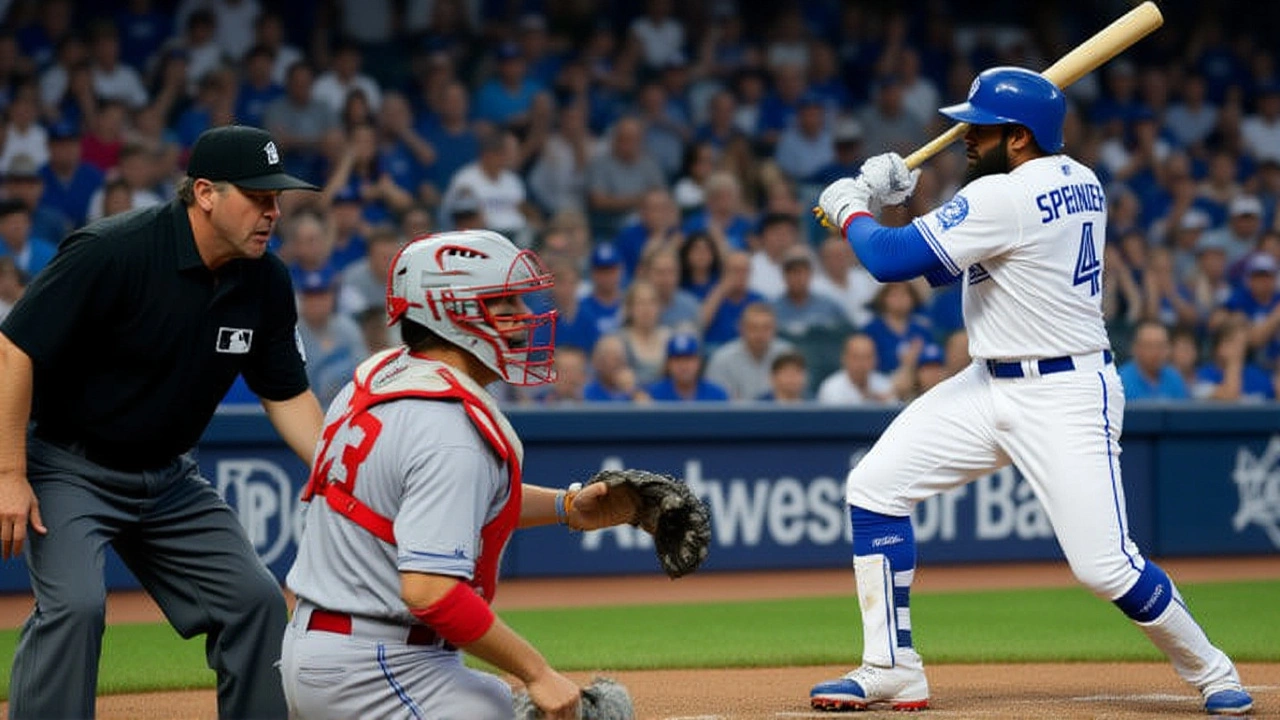When George Springer, the designated hitter for the Toronto Blue Jays, stepped up to the plate on September 25, 2025, the stakes were crystal clear: a bases‑loaded opportunity to seize a two‑run lead in the American League East. The game, held at the Rogers Centre in Toronto, pitted the Blue Jays against the Boston Red Sox and unfolded under a sky that felt as tense as a playoff box score.
Background to the September 25 Game
Both clubs entered the matchup with their eyes glued to the division table. The Blue Jays held a slender lead over the New York Yankees, while the Red Sox were fighting to stay within striking distance. Manager John Schneider had already shuffled his lineup to maximize run production, and a key error by Red Sox shortstop Trevor Story had loaded the bases with two outs in the bottom of the second inning.
The Controversial Call and Immediate Fallout
Springer faced right‑hander Lucas Giolito and pulled a 2‑1 changeup down the third‑base line that glanced off the dirt and, according to most replays, bounced fair before crossing the bag. Home‑plate umpire Scott Barry signaled foul.
Instantly, the broadcast’s replay screen lit up with a split‑second view of the ball’s trajectory. Yet MLB rules classify a foul ball on a third‑base line as non‑reviewable, leaving the call to rest solely on Barry’s judgment. The Blue Jays’ replay room, staffed by a team of analysts, argued the ball was fair; Schneider later confirmed they “thought it was fair” and were frustrated that “it’s not a reviewable play.”
Springer’s reaction was immediate and visceral. Footage captured by analyst Jimmy O'Brien, known online as “Jomboy,” showed the pitcher‑leveling dugout, his face a mask of disbelief. A lip‑reading breakdown, which quickly went viral on social media, revealed Springer muttering, “If they want New York to win just tell me and give it to them already. How do you miss that? It is right in front of him.” The rawness of his words hit fans like a home run in a tight game.
On the very next pitch, Giolito lofted a sinker well outside the strike zone, and Springer swung and missed. The strikeout left the bases loaded and the Blue Jays still trailing 1‑0. The silence that followed was broken only by Springer’s guttural expletive and the clatter of his bat against the dugout bench. Schneider had to dash out of the box to calm his leadoff man, fearing an ejection that could have further dented a fragile morale.
Reactions from the Bench and the League
After the 4‑1 Red Sox victory, Schneider held a post‑game press conference where he reiterated the fairness of the ball, “It’s a fair ball down the third‑base line. I thought it was fair. People in our replay room thought it was fair. And it’s not a reviewable play. Sucks.” He added, “It’s two runs there — it’s a 2‑1 game. I don’t know if it’s why we lost, you know what I mean? Things can change over the course of the game.”
Meanwhile, Major League Baseball was making headlines of its own, announcing the upcoming deployment of the Automated Ball‑Strike Challenge System (ABS) for the 2026 season. Though ABS focuses on strike‑zone calls, the controversy reignited long‑standing debates about expanding replay for foul‑ball judgments.
What the Call Means for the AL East Race
- Blue Jays and Yankees are now tied for first place with four games left.
- The loss cost Toronto a potential two‑run swing that could have created a four‑run cushion.
- Boston’s win pushes the Red Sox a game behind the leaders, keeping them alive in the wild‑card chase.
- New York’s 8‑1 victory over the Chicago White Sox on September 26 maintains their momentum.
The ripple effect is clear: if the ball had been ruled fair, the Blue Jays likely would have taken a 2‑1 lead, altering the psychological flow of the game and possibly the next night’s outcomes. In a division where every run counts, the foul call became a defining moment.

Looking Ahead: ABS and Future Officiating
Springer’s outburst has added fuel to the fire surrounding umpire accountability. Fans and players alike are demanding that MLB reconsider its replay policy for border‑line foul balls, especially in high‑leverage situations. While ABS promises consistent strike‑zone calls, many analysts argue that a broader technology suite—perhaps a “foul‑ball tracker”—could prevent disputes like this.
For now, the league’s official stance remains unchanged: the call stands, and the Blue Jays must move forward. Schneider hinted that the team will “focus on the next game, keep grinding, and let the kids play.” The next series against the Oakland Athletics will be a litmus test for the club’s resilience.
Historical Perspective on Umpire Disputes
This isn’t the first time an umpire’s decision has become a flashpoint in baseball lore. Remember the 1975 “Pine Tar” incident that saw George Brett’s home run nullified, or the 2019 “Raising the Roof” controversy where a missed call at first base sparked a season‑ending debate on replay expansion? Each episode nudged MLB toward incremental rule tweaks, and the Springer episode may be the catalyst for the next wave.
What’s certain is that the Blue Jays’ fan base, already buzzing about the team’s late‑season surge, now has a fresh narrative: a perceived slight that fuels a rivalry with the Yankees and fuels calls for greater transparency in officiating.
Frequently Asked Questions
Why was the foul ball not reviewable under MLB rules?
MLB’s current replay system excludes foul‑ball calls on the third‑base line because they’re classified as “judgment calls.” Only home‑run, safe/out, and strike‑zone calls are automatically reviewable. The league argues that expanding review could slow the game, though recent controversies have sparked debate about changing the policy.
How did the controversial call affect the Blue Jays’ standing in the AL East?
The missed fair ball likely cost Toronto two runs, turning a potential 2‑1 lead into a 1‑0 deficit. After the Red Sox secured a 4‑1 win, the Blue Jays fell behind the Yankees, leaving both teams tied with only four games left in the season.
What is the Automated Ball‑Strike Challenge System (ABS) and when will it be used?
ABS is a technology that automatically determines whether a pitch is a ball or a strike using high‑speed cameras and AI. MLB announced it will be implemented league‑wide starting with the 2026 season, aiming to reduce human error behind the plate.
Who else voiced concerns about the call?
Beyond Springer, several teammates echoed frustration in the dugout, and analysts like Jimmy O'Brien highlighted the incident on his YouTube channel, arguing that the play should be reviewable in future seasons.
Will MLB consider changing replay rules after this incident?
Although the league has not committed to a rule change, the outcry adds pressure. Officials have hinted that a broader review of “border‑line” plays could be on the agenda when ABS is introduced, potentially expanding the replay scope.

